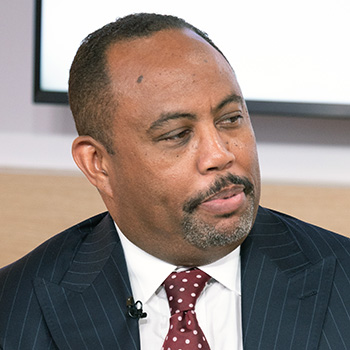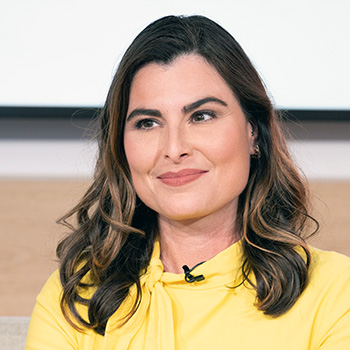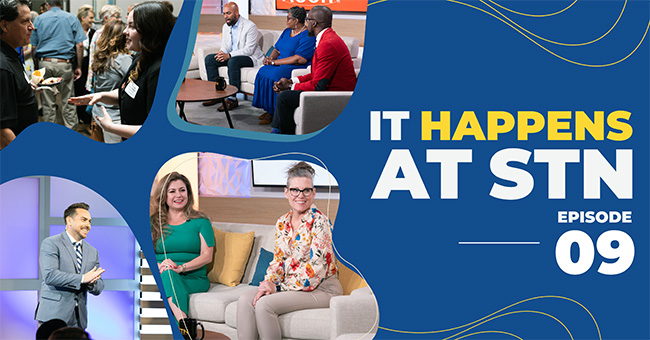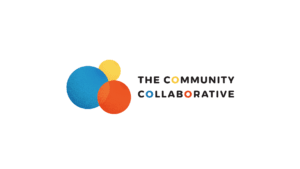Journalism, especially local television news, has undergone a shift and transformation during recent years. And critics would argue, not for the better.
Spending mandates from corporate ownership have led to staff slashing and external, often politicized, attacks have eroded public confidence in what was, traditionally, a trusted institution of information.
So, where does the industry go from here and what does the next generation of journalists need to know before they venture out in the real world to reach that destination?
For an incredibly important discussion on the future of local media during the June episode of It Happens at STN, Cronkite School Dean and Professor Dr. Battinto Batts Jr. and television reporter and anchor turned educator Vanessa Ruiz talk about the power of local media, how to make sure the industry is representative of the population, and the best ways to ensure its continued existence.
Watch the Community Collaborative Action Panel
Action Panelists
Community Collaborative is part of It Happens at STN, a local news hour dedicated to community growth and actionable solutions.
Each month, business leaders deliver best practices for diversity, equity and inclusion that are effective and applicable.

Dr. Battinto Batts Jr.
- Dean & Professor
- Cronkite School of Mass Communication
- Arizona State University

Vanessa Ruiz
- Deputy Vice President
- Educational Outreach & Student Services
- Arizona State University
Action Panelists
Dr. Battinto Batts Jr.
Dean & Professor – Cronkite School of Mass Communication / Arizona State University
Vanessa Ruiz
Deputy Vice President of Educational Outreach & Student Services / Arizona State University

Power of Empowerment
We want to make sure that people have a broad appreciation for the power of media and how it formulates our opinions and perceptions about people, about where they come from and their backgrounds, and that they really aren’t feeding into stereotypes. The power of media can really formulate how we perceive people and also has the power to build bridges.
At the Cronkite School, we take every opportunity that we can to utilize media to build bridges, amongst our students and amongst our faculty and staff. We take that as a tremendous responsibility. As we are preparing our students in our curriculum to go into careers, we want them to be comfortable being able to bring their whole selves into the newsrooms that they’re going into so that they can effectively cover communities and be advocates for communities, and tell the stories of communities that perhaps would not be told, were they not there.
If we empower them to do that while they’re at Cronkite, then they’ll be used to doing that when they go into their jobs. We think that that is part of the reason why recruiters from all over are coming to look for students at Cronkite and bringing them into their newsrooms.
Connecting Threads
It is, really, a continuous process of evolution and staying at the cutting edge or ahead of the curve. To do that means that you really have to be connected to communities. We have the ability at the Cronkite School to recruit across the nation. It surprises me every time, at the beginning of the year when I get an opportunity to meet students and their parents and their family and [find out] where they come from. We truly have the ability to recruit nationally and internationally.
What we want to do is make sure that the Cronkite School is a fabric that represents multi- perspectives, and multi-experiences, [so] our students and our staff can look at that fabric and see themselves. That’s part of the secret sauce, I think, really having a truly intentional and inclusive culture.
Spread the Wealth
Our stature, and we are proud of what we’ve been able to do well, enables us to recruit some of the finest faculty, anywhere. People who come out of the industry and want to come to work at the Cronkite School. So they come with cutting-edge ideas of what’s really current and happening in the industry, and then able to pass that along to our students. We’re really in a very fortunate position.
That’s something that we don’t just see as us hoarding to ourselves, but how we can share that with others, how we share that with the community, [and] how we share that with other schools. It’s not about competition as much as everyone being successful. This endeavor of journalism and broader media is so important to our global society that it really is incumbent upon us to do it that way.

Big Responsibility
When I had the privilege of working at the Cronkite School and being in close contact with students, I said, “in addition to seeing yourselves as reporters and producers, see yourselves as leaders.” I’ll also say that to our diverse students. That was critical for them to hear it. Because, I’m not quite sure how often they’ve been told that they too, can occupy those C-suites, [and] that they too can be those general managers who are making those critical decisions when it comes to what kind of stories are being covered or how they’re being covered.
I think it’s important that we start to let them know early on as early as possible: You too can do that, and let me show you how. That is a part of the responsibility. I think that, certainly, the Cronkite School has taken [that] on and we also take on as community and educational leaders when we’re working with all different kinds of students across our state.
Lessons Learned
(Editor’s note: In late 2015, Ruiz found herself at the center of a nationwide debate on the pronunciation of Spanish words in newscasts. She was one of the first anchors in the country to use a traditional rolled Rs in the pronunciation and became a lightning rod for criticism for doing so.)
I use that experience in the sense of showing [people] that I was simply being Vanessa. At the time and to this day, I still don’t think I did anything exceptional aside from publicly saying that I am proud of who I am. I’m proud of my background. I’m proud of my cultural roots. That is what, ultimately, led me now to do this kind of work. To also help others understand that they have nothing, absolutely nothing to be ashamed about or embarrassed.
On the contrary, that multicultural perspective, those lived experiences, when we talk about things like media and journalism, but in business, in the things that we do in our community, and how we interact with our neighbors, That is an asset. That’s not anything to be ashamed about.
So going back to the importance of partnership and working together, that’s really the only way that we’re going to be making sure that we are putting people in the right place, [and] that we’re welcoming of all perspectives.
Moving Forward
Talking to those younger generations about the importance of truly being themselves, that’s not easy. Opening those doors, being those trailblazers. This is a room full of people whom I know, know what that’s like. That’s a tall ask. I’m hopeful, and I’m optimistic that we’re heading in the right direction.
I’m originally from Florida. I have a lot of hope right now. Much more hope in the state of Arizona than I do say in a state like Florida. That’s saying a lot, right? We have to think about how far Arizona has come. I have a lot of hope, and I have a lot of pride in this state. I have no doubt that we’re, again, heading in the right direction.
Know the Difference
It’s important to know the difference and understand the difference between media and good, solid journalism. It’s not the same thing. We talk about the media, and I think most people immediately think of the CNNs of the world and the FOXs of the world. The reality is we need good, rock-solid journalism now more than ever.
You know, once a journalist, always a journalist. I really truly believe that good journalism is critical to making sure that we maintain our functioning democracy. I’m not saying it’s perfect, but I do think it is a critical pillar in our democracy. I would hope that you all support that. That you all support not just that good journalism that can make an impact, that changes lives, that holds the powerful accountable, but also as a noble profession for young and up-and-coming journalists who literally have to sometimes fight in their own homes with their families because of the profession that they are choosing to pursue.




